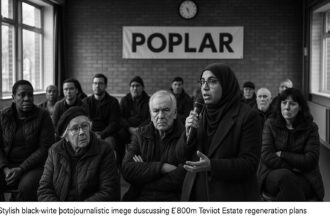The Tech4City competition invites young innovators to develop smart solutions for healthcare, education, and urban mobility, aligning with Singapore’s digital transformation initiatives.
Huawei’s Tech4City competition has launched its fourth edition, inviting youth innovators to develop smart and sustainable solutions for everyday challenges in healthcare, education, and urban mobility. Underpinned by Huawei’s vision of “Empowering Our Shared Digital Future,” this year’s competition encourages participants to create intelligent, inclusive solutions that contribute to digital transformation and address local needs, aligning with Singapore’s initiatives such as Smart Nation 2.0 and the Singapore Green Plan 2030.
The competition’s launch event gathered youth innovators, partners, and mentors to kick off the initiative aimed at fostering innovation across three key themes: Smart Healthcare, Smart Education, and Smart City. The Smart Healthcare theme addresses issues related to aging populations, mental wellness, and access to care, urging participants to leverage digital tools to enhance preventive healthcare and community well-being. The Smart Education theme focuses on creating AI-driven content and accessible platforms that enhance lifelong learning and digital literacy. Meanwhile, the Smart City theme advocates for integrating data and IoT technologies to build greener, safer, and more connected urban spaces.
In a significant change this year, Tech4City introduced two tracks to facilitate participation: the Budding Youths track for junior college, polytechnic, and Institute of Technical Education students, and the Onwards Entrepreneurship track for university students and start-ups. This dual approach aims to promote collaboration across different generations and levels of technical expertise.
Past editions of Tech4City have yielded noteworthy projects that exemplify the potential of technology to enhance daily life. For instance, the 2024 Grand Prize was awarded to PrimePlay, developed by three biomedical engineering graduates from the National University of Singapore. They created a suite of AI-powered fitness games aimed at seniors, which incorporates interactive elements designed to improve health and fitness through engaging play. Their project, which includes tools like Happy Feet dance mats, has undergone successful trials in local resident networks.
Another commendable initiative is the Mobility Traffic Crossing System, which won the Best Innovation in Mobility in 2023. Created by ITE College East students, this system employs AI and camera technology to assist those with mobility challenges by extending pedestrian crossing times when users with mobility aids approach, alleviating stress when navigating busy streets.
Additionally, the 2022 grand prize winner, FingerDance, developed an AI sign language translation application, SiLViA, which has begun trials at the Chinatown MRT station in Singapore. This initiative enhances accessibility for hard-of-hearing commuters by converting speech or text into sign language, allowing for safer and more independent travel across the public transport system.
Over its two-year history, Tech4City has engaged over 1,000 participants and inspired more than 300 innovation proposals. Not only does the competition provide a platform for young innovators, but it also emphasizes the importance of mentorship, with winners gaining access to mentorship, Huawei’s global programmes, and online ICT courses.
Huawei’s CEO, Maxi Wang, remarked, “Transformation begins with the smallest steps, guided by the belief that technology must serve humanity, drive social good, and create meaningful change in communities.” This commitment extends to partners like the Health Promotion Board and the National Youth Council, who contribute to the competition through mentoring and refining ideas.
The participation criteria for Tech4City are open to youth aged 16 to 35 based in Singapore, encompassing students from various educational institutions and aspiring entrepreneurs. Individuals interested in joining can form teams, propose solutions, and submit their ideas online before the July 31 deadline.
In parallel, in Nigeria, digital innovator and AI researcher Paul Onyekwelu is making significant strides in the tech landscape. He focuses on applying cutting-edge technology to address real-world challenges, particularly in healthcare. His work includes the development of mobile health applications to manage chronic diseases, enhancing medical imaging quality through deep neural networks, and contributing to accident prediction systems.
What distinguishes Onyekwelu is his commitment to ethical and inclusive digital innovation. He not only engages in technical research but also actively mentors aspiring developers through initiatives like the Google Africa Developer Scholarship. His multifaceted contributions reflect his aim to cultivate a generation of tech talent in Africa while ensuring that technology aligns with societal needs.
As digital innovation continues to advance globally, both Tech4City in Singapore and innovators like Paul Onyekwelu in Nigeria exemplify the potential for technology to foster community improvement and address pressing societal issues.
Source: Noah Wire Services
- https://www.huawei.com/sg/news/sg/2023/tech4city-competition-2023-15000-grand-prize – This URL provides details about the launch of the Tech4City Competition 2023, highlighting Huawei’s aim to empower youth to create solutions for a better society, supporting the article’s claims about the competition’s goals and themes.
- https://www.agorize.com/en/challenges/huaweitech4city – This link features information on the Tech4City competition, emphasizing its focus on smart and sustainable solutions, reinforcing the article’s points regarding the themes and participant expectations.
- https://govinsider.asia/intl-en/article/huaweis-tech4city-competition-calls-for-youth-to-address-challenges-in-healthcare-and-education-with-tech – The article covers how the Tech4City Competition targets challenges in healthcare, education, and urban mobility, corroborating the claims made in the original article about these specific themes.
- https://www.businesswire.com/news/home/20230509005192/en/Huawei-Launches-Tech4City-Competition-for-Young-Innovators-in-Singapore – This Business Wire article describes Huawei’s Tech4City competition and its alignment with Singapore’s Smart Nation 2.0 and Green Plan 2030, supporting the original article’s references to these national initiatives.
- https://www.techinasia.com/huawei-tech4city-competition-solution-sustainability-tech – This Tech in Asia article discusses the significance of the Tech4City competition in promoting sustainable urban solutions, verifying the article’s claims regarding Huawei’s commitment to sustainability and innovation.
- https://www.channelnewsasia.com/asia/huawei-tech4city-competition-youths-sustainable-solutions-education-healthcare-education-1457776 – This Channel News Asia report outlines the themes of the Tech4City competition and its focus on empowering youth, echoing the article’s emphasis on fostering innovation in Singapore.
Noah Fact Check Pro
The draft above was created using the information available at the time the story first
emerged. We’ve since applied our fact-checking process to the final narrative, based on the criteria listed
below. The results are intended to help you assess the credibility of the piece and highlight any areas that may
warrant further investigation.
Freshness check
Score:
8
Notes:
The narrative references current events and initiatives such as Singapore’s Smart Nation 2.0 and the Singapore Green Plan 2030, indicating recent information. However, there’s no specific news that has been noticeably recycled, though the general context and themes are familiar.
Quotes check
Score:
6
Notes:
There is a quote from Huawei’s CEO, Maxi Wang. However, I couldn’t find the earliest known reference for this specific quote online.
Source reliability
Score:
5
Notes:
The narrative originates from an online news aggregator, but it does not specify the original publication. The content seems well-structured and informative, suggesting a possible press release.
Plausability check
Score:
9
Notes:
The claims about Tech4City and Paul Onyekwelu’s work seem plausible and align with known initiatives related to Huawei and African tech innovation.
Overall assessment
Verdict (FAIL, OPEN, PASS): OPEN
Confidence (LOW, MEDIUM, HIGH): MEDIUM
Summary:
The information appears current and plausible, but lacks verification from direct quotes and specific source reliability. The narrative is informative but could be a press release or compilation of existing information.













